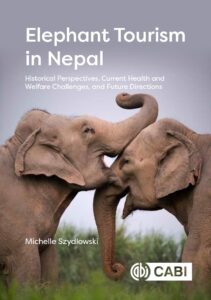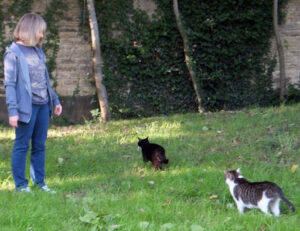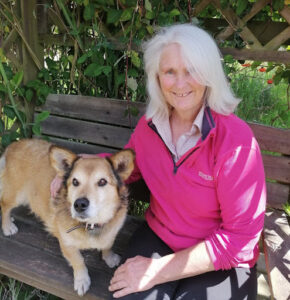The Anthrozoology as International Practice working group was founded in 2021 by a group of established scholars, early career academics, and postgraduate students living in four countries. Thanks to hosting provided by the University of Exeter’s EASE working group, AIP was able to present two anthrozoology conferences (2021 and 2022) aimed at students from undergraduate to postdoctoral levels. The working group continues to host free, online conferences and student support thanks to dedicated volunteers and the support of numerous grants and sponsorships (see sponsor page). Our aims include:
● Offering opportunities for collaborative writing through online meetings
● Offering opportunities for collaborative conference planning and presentations
● Offering mentoring and peer-support for students and early career researchers in anthrozoology and related fields. (What is anthrozoology? See this link: https://encyclopedia.pub/entry/11097)
● Supporting advocacy towards improving animal health and welfare (humans included)
● Supporting the approach that otherthanhuman animals are ethically significant beings and are worthy of consideration as equal subjects (not simply objects) in research
● Supporting and promoting research in (but not limited to): education, awareness, and conservation practices which view otherthanhuman animals as equal partners in the creation of meaning, as well as morally significant participants
● Offering opportunities for informal writing (blogs, columns) on a variety of platforms
Meet the AIP Team
Sarah Oxley Heaney, PhD candidate (Anthrozoology)
Founding member & organizing committee 2020-current 
Sarah is a fifth-year, part-time PhD candidate in Anthrozoology at the University of Exeter. Her doctoral project, “Kissing Sharks?” explores the unconventional, and intimate shark-human relationships co-developed by Cristina Zenato (www.cristinazenato.com) and a shiver of Bahamian Caribbean Reef and Nurse sharks. The project examines the origins, evolution, and impact of shark-listening, aiming to contribute to reshaping societal perceptions of sharks. Sarah is motivated to use her academic investigations to add to the humanist de-centering ‘turns’ pioneered by post-anthropocentric, post-humanist scholars. For Sarah, anthrozoology is more than an academic pursuit. Her aim is to engage her anthrozoological knowledge, as a scholar-activist, and the EASE ethos in the world, to join the effort in creating a paradigm shift in how morethanhuman-animals are viewed. Her commitment to this goal is reflected in her research on cat abandonment in Saudi Arabia, the co-founding of The Anthrozoology Podcast and the Anthrozoology as International Practice Conference with her AiP colleagues. Sarah is also a co-founder of e-CATT, and collaborates with cross-disciplinary academics whose interests, interlink with (Felis catus) or small wild cats. Further information about Sarah’s research outreach, publications and collaborations, can be found at https://www.kissingsharks.com/publications.
Kris Hill, PhD (Plant Molecular Biology), PhD (Anthrozoology)
Founding member and organizing committee 2020-current
Dr. Kristine Hill earned her PhD in Anthrozoology from the University of Exeter in 2023. Her doctoral research focused on discourses surrounding roaming cats (Felis catus) and cat-human relations. Other academic areas of interest include more-than-human families, domestication, griefwork, animal representations, Mediterranean street cats and tourism, and cat-human cultures. Since changing fields in 2019, Kris has authored or co-authored over 18 peer-reviewed papers or book chapters and presented her research to a range of audiences. As visiting professor at the University of Hradec Králové (UHK), Kris developed and delivered an undergraduate level class entitled ‘An Introduction to Anthrozoology/Human-Animal Studies’ (2024-2025). She continues her affiliation with UHK as a research associate and member of an international research team project, funded by the Philosophical Faculty (FF-UHK).
Kris is a trustee of the Society for Companion Animal Studies (SCAS), a board member of the International Society of Anthrozoology (ISAZ), and co-founder of Anthrozoology as International Practice (AIP), The Anthrozoology Podcast, and the Cat Academic Think Tank (eCATT). Visit her website to learn more about Kris’ projects and interests https://academiccatlady.com/
Michelle Szydlowski, PhD (Anthrozoology)
Founding member and organizing committee 2020-current
Michelle spent decades teaching in zoos, museums and public schools prior to following her passion into Anthrozoology. She now works at Miami University.
Her research focuses on how conservation and tourism practices impact endangered species. Her PhD focused documenting the health and welfare of individual elephants in Nepal, and the members of marginalized communities who care for them. In addition, she documented governmental, NGO and INGO programs purporting to help elephants, and examined how their interactions impacted population-level health and individual elephant lives. The initial study has now expanded into a decade+ examination of individual elephant health and welfare in a multitude of settings.
Michelle continues to work on community-based conservation efforts focused on endangered species preservation, elephant welfare, wildlife health, one health/one welfare, and sustainable development. She has served on several non-profit boards, and hopes to spark interest and understanding by speaking at conferences and to community groups about elephants, biodiversity, community-based conservation, neurodiversity, anthrozoology, etc. Current projects include a companion animal study with co-researchers from four countries.
Michelle co-founded and co-hosts The Anthrozoology Podcast and Anthrozoology Speaks, platforms for ongoing discussions about complex species relationships. She is honored to serve as the President of the International Society of Anthrozoology beginning this month. Visit her at internationalelephants.org (or email info@internationalelephants.org). You can find her book on Amazon and other booksellers.
Tom Aiello, PhD (Anthrozoology), PhD (History and Africana studies)
Founding member and organizing committee 2020-2023, ongoing supportive role
Thomas Aiello is a professor of history and Africana studies at Valdosta State University. He is the author of more than twenty books and more than sixty peer-reviewed journal articles. His books have won multiple awards and have been nominated for others, including the Pulitzer Prize. He holds PhDs in history and anthrozoology and also writes about the relationship between humans and animals, in particular the role of speciesism and human supremacy in creating vulnerabilities for nonhuman animals. He is co-founder and co-editor of Animal History. Learn more at www.thomasaiellobooks.com.
Jes Hooper, PhD (Anthrozoology)
Founding member and organizing committee 2020-2023

Jes Hooper earned her Anthrozoology PhD from the University of Exeter. Jes’ doctoral research focused on trans-species relations and disappearance in the Anthropocene as explored through the lens of civet (Viverrid) species. Jes has published several academic works on the topic of human-civet relations including civet coffee production and authentication, civet coffee tourism, the rising phenomenon of civet companionship and Civet Lover communities, and the retribution killings of civets in response to the 2004 outbreak of SARS. Jes has also co-authored several papers on the topics of animals in tourism, animal ethics, and media portrayals of animals during times of crises.
As a part time postgraduate researcher, Jes works as the Campaigns and Research Manager for a small animal charity in the UK and is the founding director of the Civet Project, a research initiative centered upon the aim to better understand human-civet relations. The Civet Project is currently involved in several transdisciplinary and transnational collaborative projects spanning the arts, humanities and biological sciences, and is a leading partner of the Emerging Voices for Animals in Tourism initiative which has thus far culminated in a series of conferences and an edited book of the same name.
For more information and for a full portfolio of works, please see www.thecivetproject.com or follow Jes on Twitter for academic updates @Jes_Hooper
Gill Howarth
Organizing Committee 2023-current
Gill is in her final year of her PhD in Anthrozoology with the University of Exeter. Her research is focussed on exploring human-cat social interactions to understand some of the more unrecognised domestic cat behaviours in order to raise awareness and improve cat welfare. Gill elected to study Anthrozoology because of her interest and concern for non-human animals and her respect for their individuality and autonomy. Gill is a founding member of the Cat Academic Think Tank (eCATT), and has been involved with the Anthrozoology as International Practice (AIP) conference since 2023. When Gill is not studying, she is, and has been, involved with several animal charities and non-profit organisations. This has included undertaking long and short-term surveys of British mammal species, fostering cats, and collecting data on the social behaviour of American black bears.
Irene Perrett
 Organizing Committee 2023-Current
Organizing Committee 2023-Current
Irene Perrett is a part-time 3rd year PhD student at the University of Exeter having completed the MA Anthrozoology programme in 2022. Her research focuses on animals’ narratives in the context of more-than-human grief. She has been involved with the AIP Conference since 2023, and has contributed to the upcoming Animated Wor(l)ds project. When not studying, Irene supports foster dogs who have experienced grief and trauma, is a Fellow of the ethical organisation International Equine Professionals, and a tutor for The DoGenius Institute.
Louise Hayward
Organizing Committee 2023-2024, continuing supportive role.
